Unit 6 Do you like bananas?全单元学案(含答案解析)
文档属性
| 名称 | Unit 6 Do you like bananas?全单元学案(含答案解析) | 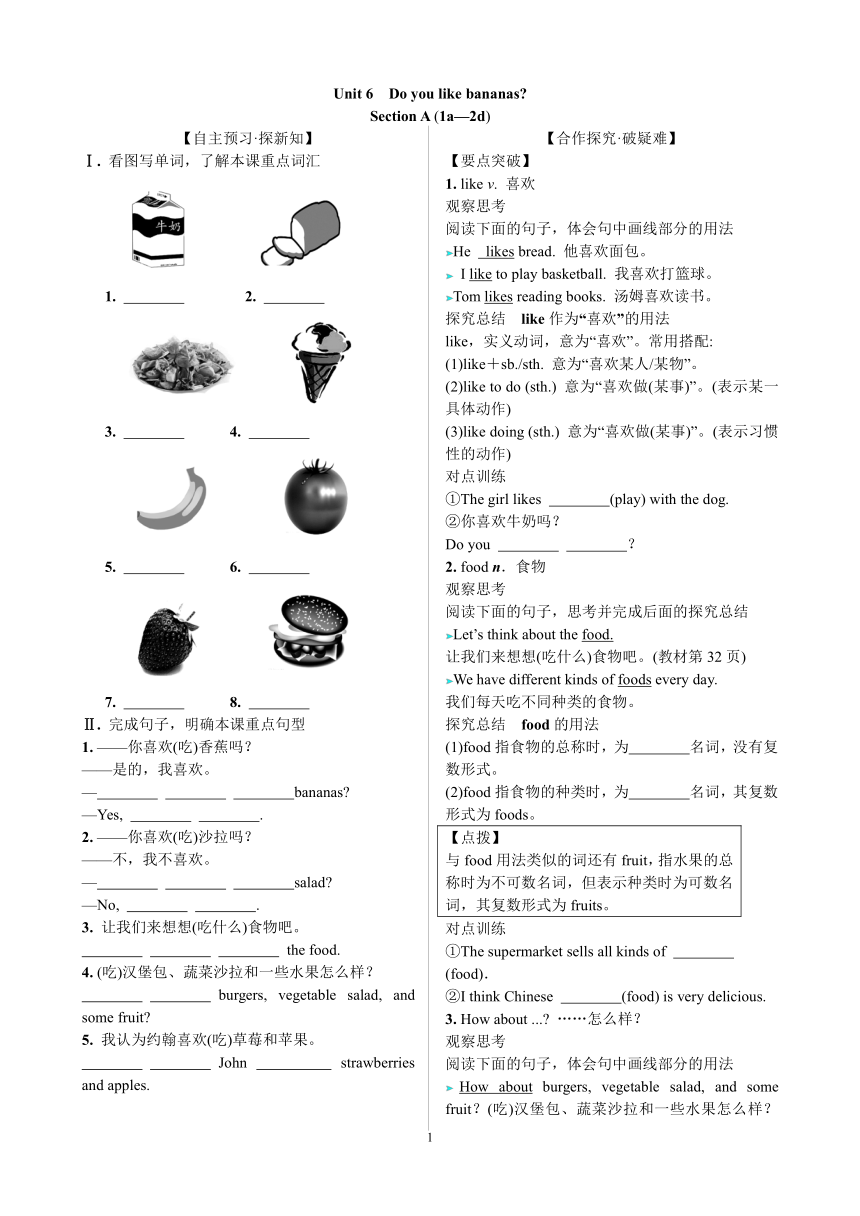 | |
| 格式 | zip | ||
| 文件大小 | 4.7MB | ||
| 资源类型 | 教案 | ||
| 版本资源 | 人教新目标(Go for it)版 | ||
| 科目 | 英语 | ||
| 更新时间 | 2018-10-22 17:33:35 | ||
图片预览

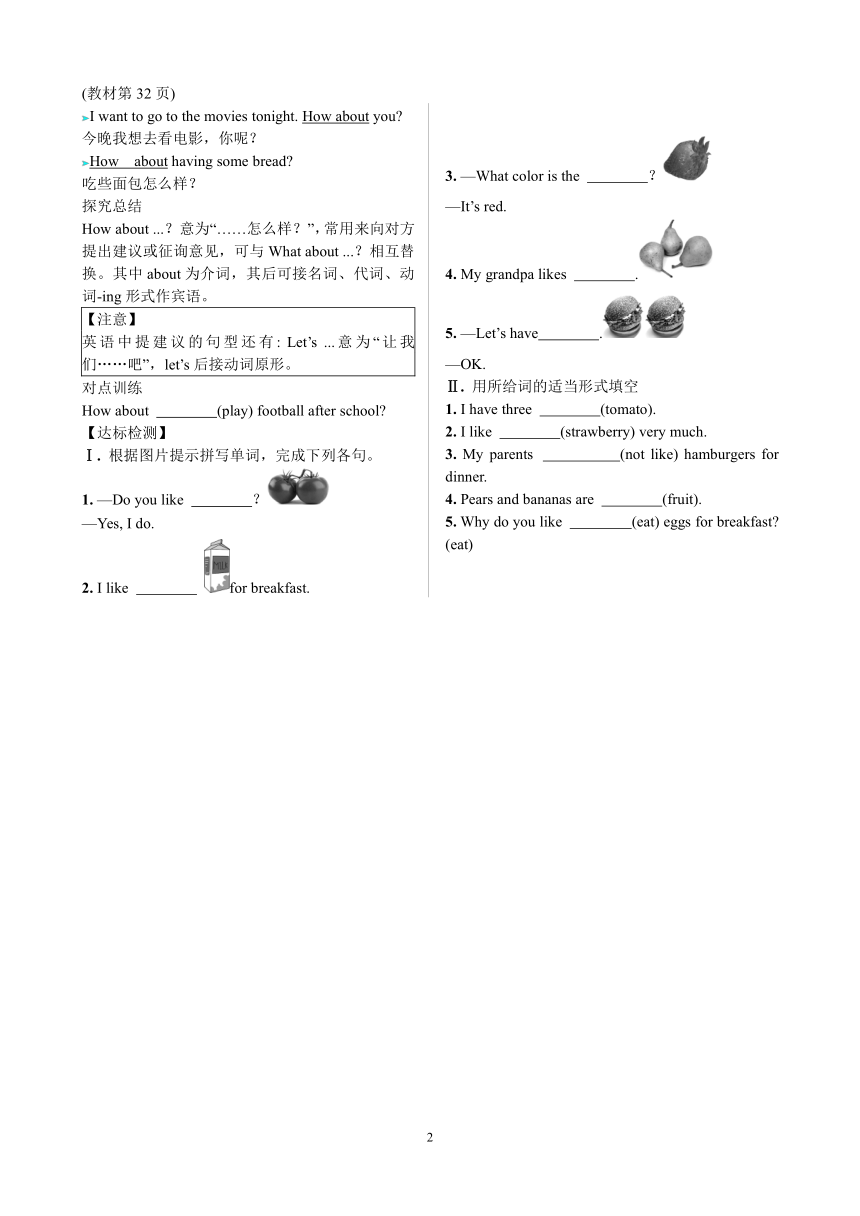
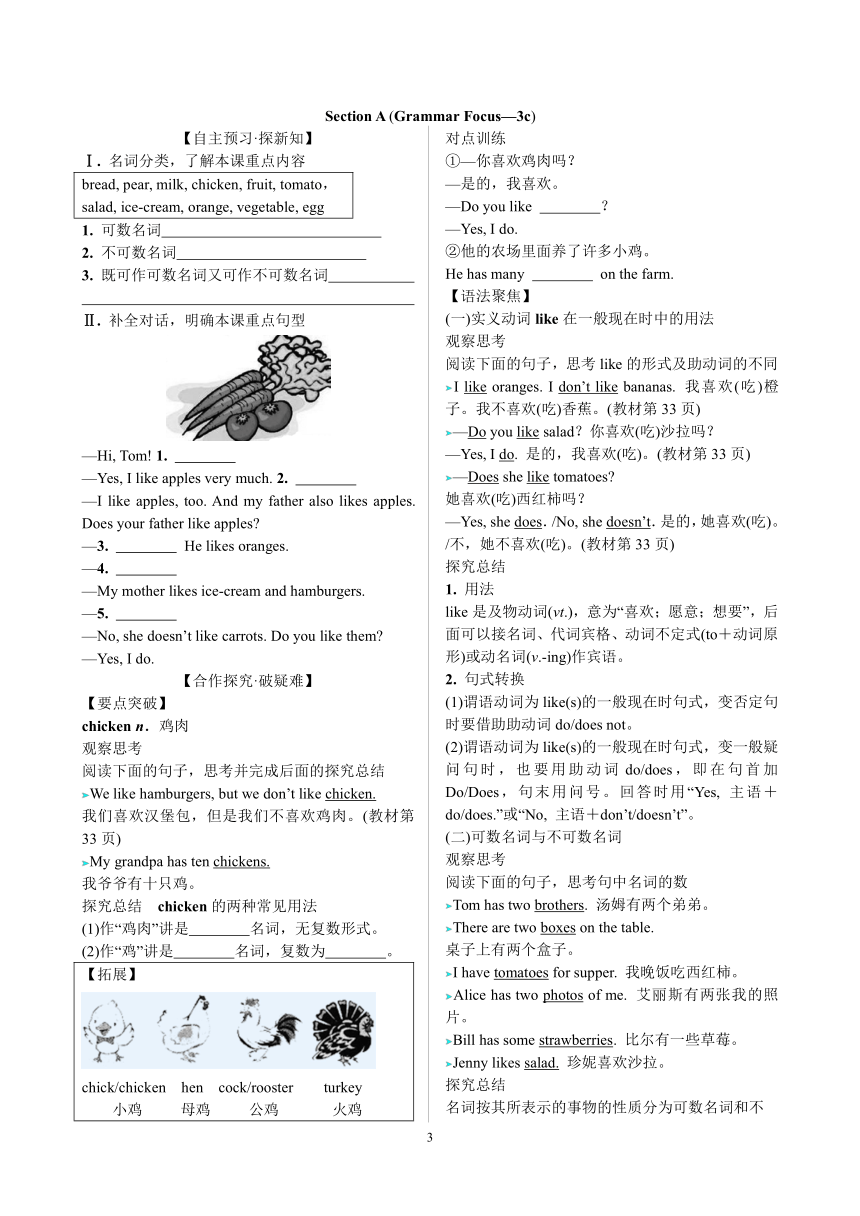
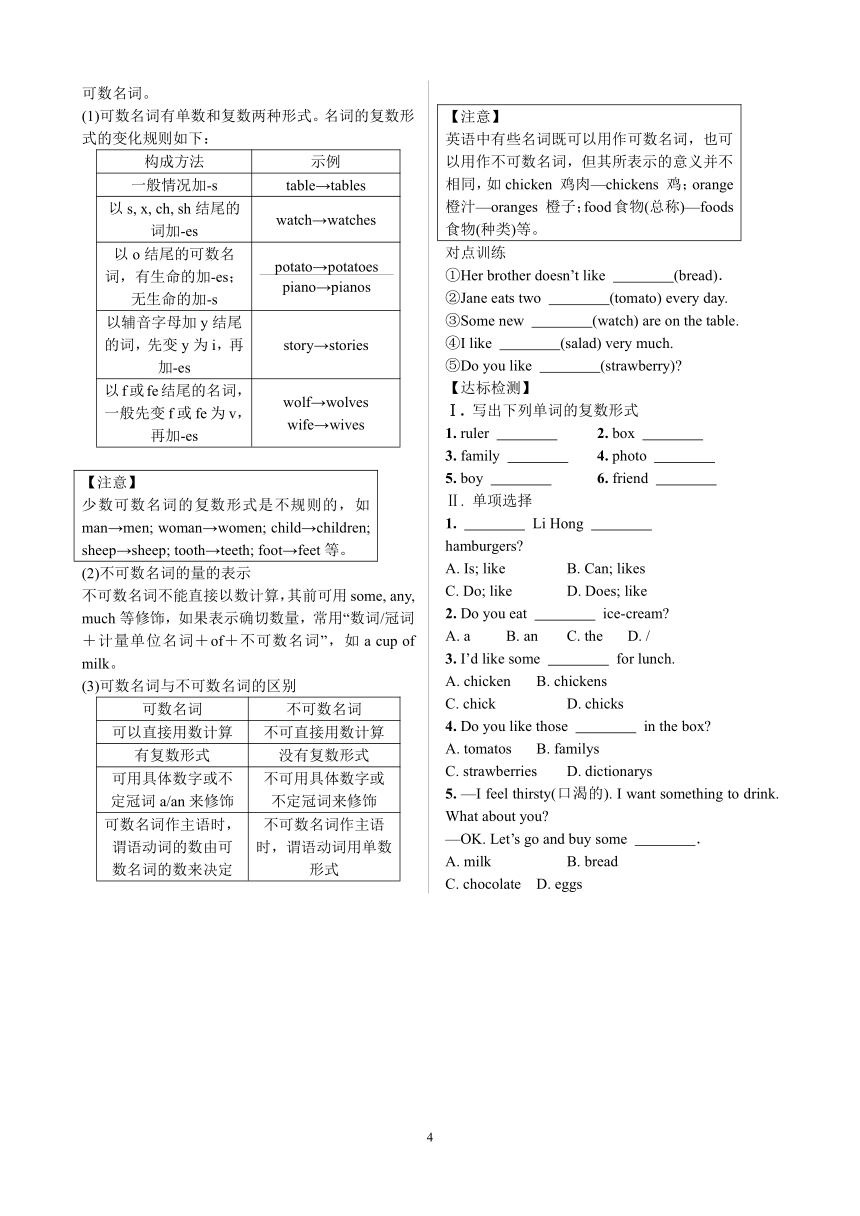
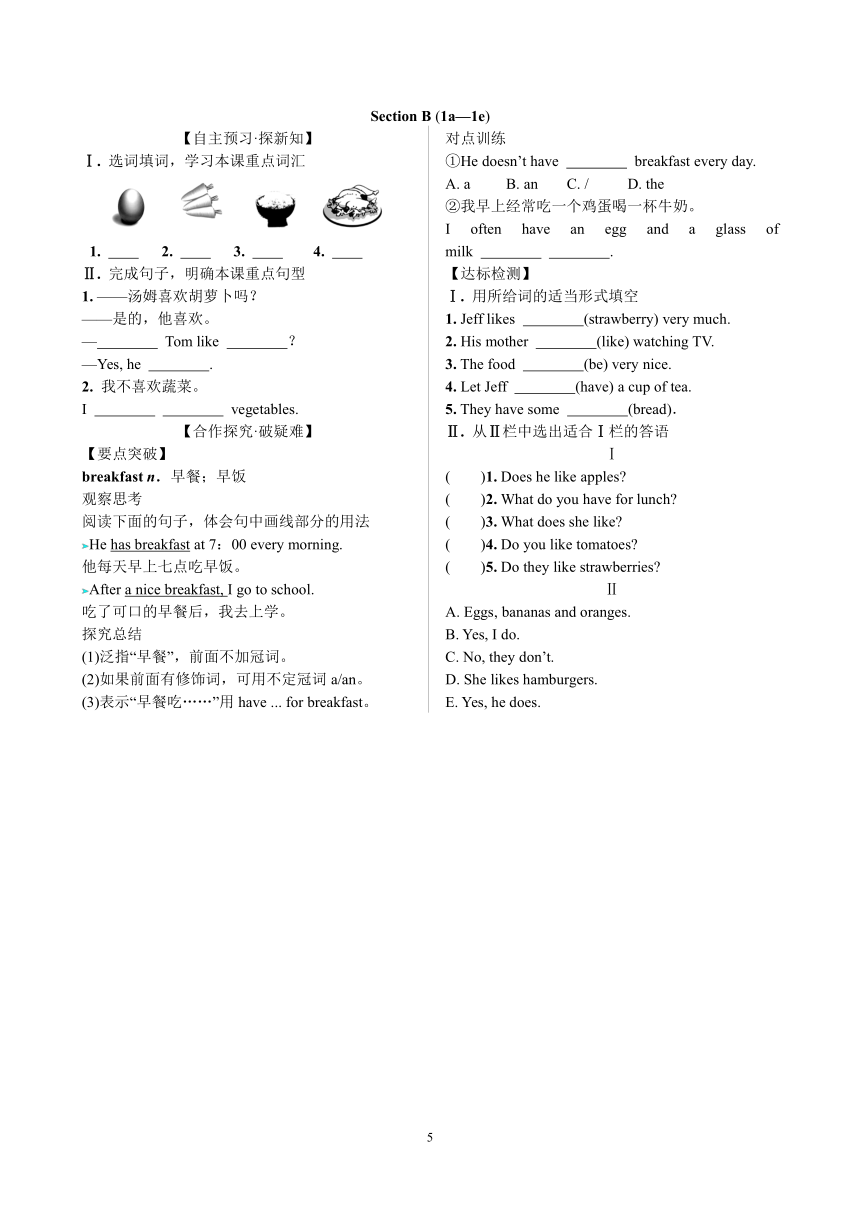
文档简介
Unit 6 Do you like bananas?
Section A (1a—2d) 【自主预习·探新知】
Ⅰ. 看图写单词,了解本课重点词汇
1. 2.
3. 4.
5. 6.
7. 8.
Ⅱ. 完成句子,明确本课重点句型
1. ——你喜欢(吃)香蕉吗?
——是的,我喜欢。
— bananas?
—Yes, .
2. ——你喜欢(吃)沙拉吗?
——不,我不喜欢。
— salad?
—No, .
3. 让我们来想想(吃什么)食物吧。
the food.
4. (吃)汉堡包、蔬菜沙拉和一些水果怎么样?
burgers, vegetable salad, and some fruit?
5. 我认为约翰喜欢(吃)草莓和苹果。
John strawberries and apples.
【合作探究·破疑难】
【要点突破】
1. like v. 喜欢
观察思考
阅读下面的句子,体会句中画线部分的用法
He likes bread. 他喜欢面包。
I like to play basketball. 我喜欢打篮球。
Tom likes reading books. 汤姆喜欢读书。
探究总结 like作为“喜欢”的用法
like,实义动词,意为“喜欢”。常用搭配:
(1)like+sb./sth. 意为“喜欢某人/某物”。
(2)like to do (sth.) 意为“喜欢做(某事)”。(表示某一具体动作)
(3)like doing (sth.) 意为“喜欢做(某事)”。(表示习惯性的动作)
对点训练
①The girl likes (play) with the dog.
②你喜欢牛奶吗?
Do you ?
2. food n.食物
观察思考
阅读下面的句子,思考并完成后面的探究总结
Let’s think about the food.
让我们来想想(吃什么)食物吧。(教材第32页)
We have different kinds of foods every day.
我们每天吃不同种类的食物。
探究总结 food的用法
(1)food指食物的总称时,为 名词,没有复数形式。
(2)food指食物的种类时,为 名词,其复数形式为foods。
【点拨】
与food用法类似的词还有fruit,指水果的总称时为不可数名词,但表示种类时为可数名词,其复数形式为fruits。
对点训练
①The supermarket sells all kinds of
(food).
②I think Chinese (food) is very delicious.
3. How about ...? ……怎么样?
观察思考
阅读下面的句子,体会句中画线部分的用法
How about burgers, vegetable salad, and some fruit?(吃)汉堡包、蔬菜沙拉和一些水果怎么样?(教材第32页)
I want to go to the movies tonight. How about you?
今晚我想去看电影,你呢?
How about having some bread?
吃些面包怎么样?
探究总结
How about ...?意为“……怎么样?”,常用来向对方提出建议或征询意见,可与What about ...?相互替换。其中about为介词,其后可接名词、代词、动词-ing形式作宾语。
【注意】
英语中提建议的句型还有: Let’s ...意为“让我们……吧”,let’s后接动词原形。
对点训练
How about (play) football after school?
【达标检测】
Ⅰ. 根据图片提示拼写单词,完成下列各句。
1. —Do you like ?
—Yes, I do.
2. I like for breakfast.
3. —What color is the ?
—It’s red.
4. My grandpa likes .
5. —Let’s have .
—OK.
Ⅱ. 用所给词的适当形式填空
1. I have three (tomato).
2. I like (strawberry) very much.
3. My parents (not like) hamburgers for dinner.
4. Pears and bananas are (fruit).
5. Why do you like (eat) eggs for breakfast? (eat)
Section A (Grammar Focus—3c) 【自主预习·探新知】
Ⅰ. 名词分类,了解本课重点内容
bread, pear, milk, chicken, fruit, tomato,
salad, ice-cream, orange, vegetable, egg
1. 可数名词
2. 不可数名词
3. 既可作可数名词又可作不可数名词
Ⅱ. 补全对话,明确本课重点句型
—Hi, Tom! 1.
—Yes, I like apples very much. 2.
—I like apples, too. And my father also likes apples. Does your father like apples?
—3. He likes oranges.
—4.
—My mother likes ice-cream and hamburgers.
—5.
—No, she doesn’t like carrots. Do you like them?
—Yes, I do.
【合作探究·破疑难】
【要点突破】
chicken n.鸡肉
观察思考
阅读下面的句子,思考并完成后面的探究总结
We like hamburgers, but we don’t like chicken.
我们喜欢汉堡包,但是我们不喜欢鸡肉。(教材第33页)
My grandpa has ten chickens.
我爷爷有十只鸡。
探究总结 chicken的两种常见用法
(1)作“鸡肉”讲是 名词,无复数形式。
(2)作“鸡”讲是 名词,复数为 。
【拓展】
chick/chicken hen cock/rooster turkey
小鸡 母鸡 公鸡 火鸡
对点训练
①—你喜欢鸡肉吗?
—是的,我喜欢。
—Do you like ?
—Yes, I do.
②他的农场里面养了许多小鸡。
He has many on the farm.
【语法聚焦】
(一)实义动词like在一般现在时中的用法
观察思考
阅读下面的句子,思考like的形式及助动词的不同
I like oranges. I don’t like bananas. 我喜欢(吃)橙子。我不喜欢(吃)香蕉。(教材第33页)
—Do you like salad?你喜欢(吃)沙拉吗?
—Yes, I do. 是的,我喜欢(吃)。(教材第33页)
—Does she like tomatoes?
她喜欢(吃)西红柿吗?
—Yes, she does./No, she doesn’t.是的,她喜欢(吃)。/不,她不喜欢(吃)。(教材第33页)
探究总结
1. 用法
like是及物动词(vt.),意为“喜欢;愿意;想要”,后面可以接名词、代词宾格、动词不定式(to+动词原形)或动名词(v.-ing)作宾语。
2. 句式转换
(1)谓语动词为like(s)的一般现在时句式,变否定句时要借助助动词do/does not。
(2)谓语动词为like(s)的一般现在时句式,变一般疑问句时,也要用助动词do/does,即在句首加Do/Does,句末用问号。回答时用“Yes, 主语+do/does.”或“No, 主语+don’t/doesn’t”。
(二)可数名词与不可数名词
观察思考
阅读下面的句子,思考句中名词的数
Tom has two brothers. 汤姆有两个弟弟。
There are two boxes on the table.
桌子上有两个盒子。
I have tomatoes for supper. 我晚饭吃西红柿。
Alice has two photos of me. 艾丽斯有两张我的照片。
Bill has some strawberries. 比尔有一些草莓。
Jenny likes salad. 珍妮喜欢沙拉。
探究总结
名词按其所表示的事物的性质分为可数名词和不 可数名词。
(1)可数名词有单数和复数两种形式。名词的复数形式的变化规则如下:
构成方法
示例
一般情况加-s
table→tables
以s, x, ch, sh结尾的词加-es
watch→watches
以o结尾的可数名词,有生命的加-es;无生命的加-s
以辅音字母加y结尾的词,先变y为i,再加-es
story→stories
以f或fe结尾的名词,一般先变f或fe为v,再加-es
wolf→wolves
wife→wives
【注意】
少数可数名词的复数形式是不规则的,如man→men; woman→women; child→children; sheep→sheep; tooth→teeth; foot→feet等。
(2)不可数名词的量的表示
不可数名词不能直接以数计算,其前可用some, any, much等修饰,如果表示确切数量,常用“数词/冠词+计量单位名词+of+不可数名词”,如a cup of milk。
(3)可数名词与不可数名词的区别
可数名词
不可数名词
可以直接用数计算
不可直接用数计算
有复数形式
没有复数形式
可用具体数字或不定冠词a/an来修饰
不可用具体数字或不定冠词来修饰
可数名词作主语时,谓语动词的数由可数名词的数来决定
不可数名词作主语时,谓语动词用单数形式
【注意】
英语中有些名词既可以用作可数名词,也可以用作不可数名词,但其所表示的意义并不相同,如chicken 鸡肉—chickens 鸡;orange 橙汁—oranges 橙子;food食物(总称)—foods食物(种类)等。
对点训练
①Her brother doesn’t like (bread).
②Jane eats two (tomato) every day.
③Some new (watch) are on the table.
④I like (salad) very much.
⑤Do you like (strawberry)?
【达标检测】
Ⅰ. 写出下列单词的复数形式
1. ruler 2. box
3. family 4. photo
5. boy 6. friend
Ⅱ. 单项选择
1. Li Hong
hamburgers?
A. Is; like B. Can; likes
C. Do; like D. Does; like
2. Do you eat ice-cream?
A. a B. an C. the D. /
3. I’d like some for lunch.
A. chicken B. chickens
C. chick D. chicks
4. Do you like those in the box?
A. tomatos B. familys
C. strawberries D. dictionarys
5. —I feel thirsty(口渴的). I want something to drink. What about you?
—OK. Let’s go and buy some .
A. milk B. bread
C. chocolate D. eggs
Section B (1a—1e)
【自主预习·探新知】
Ⅰ. 选词填词,学习本课重点词汇
1. 2. 3. 4.
Ⅱ. 完成句子,明确本课重点句型
1. ——汤姆喜欢胡萝卜吗?
——是的,他喜欢。
— Tom like ?
—Yes, he .
2. 我不喜欢蔬菜。
I vegetables.
【合作探究·破疑难】
【要点突破】
breakfast n.早餐;早饭
观察思考
阅读下面的句子,体会句中画线部分的用法
He has breakfast at 7:00 every morning.
他每天早上七点吃早饭。
After a nice breakfast, I go to school.
吃了可口的早餐后,我去上学。
探究总结
(1)泛指“早餐”,前面不加冠词。
(2)如果前面有修饰词,可用不定冠词a/an。
(3)表示“早餐吃……”用have ... for breakfast。
对点训练
①He doesn’t have breakfast every day.
A. a B. an C. / D. the
②我早上经常吃一个鸡蛋喝一杯牛奶。
I often have an egg and a glass of milk .
【达标检测】
Ⅰ. 用所给词的适当形式填空
1. Jeff likes (strawberry) very much.
2. His mother (like) watching TV.
3. The food (be) very nice.
4. Let Jeff (have) a cup of tea.
5. They have some (bread).
Ⅱ. 从Ⅱ栏中选出适合Ⅰ栏的答语
Ⅰ
( )1. Does he like apples?
( )2. What do you have for lunch?
( )3. What does she like?
( )4. Do you like tomatoes?
( )5. Do they like strawberries?
Ⅱ
A. Eggs, bananas and oranges.
B. Yes, I do.
C. No, they don’t.
D. She likes hamburgers.
E. Yes, he does.
Section B (2a—Self Check) 【自主预习·探新知】
Ⅰ. 英汉互译,了解本课重点短语
1. sports star
2. eating habits
3. 最后一个问题
4. 晚饭后
5. 健康的食物
Ⅱ. 完成句子,明确本课重点句型
1. 你早饭喜欢吃什么?
do you
breakfast?
2. 你喜欢吃什么水果?
do you ?
3. 晚饭你喜欢吃汉堡吗?
you hamburgers
dinner?
4. 我不想变胖。
I don’t fat.
【合作探究·破疑难】
【要点突破】
1. well adv.好;令人满意地
观察思考
阅读下面的句子,体会句中画线部分的用法
Sports Star Eats Well!
体育明星吃得好!(教材第35页)
Well, let’s play soccer. 嗯,咱们踢足球吧。
Alice is a good student. 艾丽斯是一名好学生。
I’m fine, thank you. 我很好,谢谢你。
探究总结
(1)well作副词,意为“好;对;令人满意地”,常用来修饰动词。
(2)well作感叹词,意为“噢,嗯,这个”,常表示同意、让步等。
(3)well还可作形容词,与good, fine的区别如下:
well
意为“身体好的,健康的”,常在句中作表语
good
意为“好的,很棒的”,常用作表语或定语,用来说明人的品质好或事物的质量好
fine
通常指天气好,也可指人的身体好
对点训练
①—Do they have a breakfast?
—Yes. They eat .
A. good; good B. good; well
C. well; well D. well; good
②—How is your mother, Anne?
—She is .
A. tidy B. beautiful
C. fine D. fun
2. healthy adj.健康的
观察思考
阅读下面的句子,体会句中画线词的含义
I think it’s healthy.
我认为它是健康的。(教材第35页)
My grandmother is in good health.
我奶奶身体状况很好。
探究总结
healthy 形容词,意为“健康的”,常用短语:keep/stay healthy意为“保持健康”,相当于be in good health,其中health作名词,意为“健康”。
【注意】
healthy的反义词为unhealthy,名词为health。
对点训练
I have an apple every day to .
A. be healthy B. keep healthy
C. healthy D. in good health
3. want v.需要;想要
观察思考
阅读下面的句子,体会句中画线部分的用法
I don’t want to be fat. 我不想变胖。(教材第35页)
I want some bread. 我想要一些面包。
My mother wants me to drink more milk.
我妈妈想让我多喝些牛奶。
探究总结 want的用法
want及物动词,意为“需要; 想要”。具体用法如下:
(1)want sth. 想要某物
(2)want to do sth. 想要去做某事
(3)want sb. to do sth. 想要某人做某事
对点训练
①She wants (buy) a pen for her little sister.
②彼得想让我和他打篮球。
Peter to play basketball with him.
写作指导
话题分析
本单元以食物为主线,围绕着谈论喜欢与不喜欢的食物以及一日三餐等语言功能展开了一系列的任务活动。
写作任务
请根据下面图画的内容,写一篇英语短文,描述Sandra三餐分别喜欢吃什么。
要求: 1. 内容要点完整,语言流畅;
2. 60词左右。
写前指导
1. 人称:第一人称。
2. 时态:一般现在时。
3. 结构提纲:
(1)逐一介绍Sandra的一日三餐。
(2)得出结论:想拥有健康的饮食。
语句储备:
(1)for breakfast
(2)want to do
(3)It’s not healthy to ...
汇思成篇
【达标检测】
Ⅰ. 用所给词的适当形式填空
1. David (ask) a volleyball star about her eating habits.
2. We should eat (health) food.
3. My father wants me (help) him.
4. He doesn’t like vegetables. His
(eat) habit isn’t good.
5. Do you (real) like it?
Ⅱ. 单项选择
1. —Do you have a dinner?
—Yes, we eat .
A. good; good B. well; well
C. good; well D. well; good
2. is my favorite(最喜爱的) food.
A. Blue B. Chicken
C. Tennis D. Basketball
3. —Do you like vegetables?
—Yes. I like very much.
A. it B. them C. their D. they
4. Bill and Tom like eating eggs.
A. does B. don’t
C. not D. doesn’t
5. is the first meal(一餐) of the day.
A. Lunch B. Supper
C. Dinner D. Breakfast
【单元复习课】 单词活用——必考单词,灵活运用
1. What do you have for (早饭)?
2. —What are these?
—They’re (鸡蛋).
3. I have some (鸡肉) for lunch.
4. I like to eat (health) food.
5. I don’t like (tomato) .
6. Cindy Smith is a (sport) star.
7. Sam plays basketball very
(good).
8. I (real) like fruit and vegetables.
短语速译——高频短语,速填速记
1. 思考; 思索
2. ……怎么样? How ...?
3. 最后一个问题 one
4. 晚饭后
5. sports star
6. eating habit
7. want to do sth.
8. healthy food
句型闯关——重点句型,逐一突破
1. 你喜欢牛奶吗?
you milk?
2. 她喜欢草莓吗?
she ?
3. 他们不喜欢橙子。
They oranges.
4. 我的弟弟不喜欢沙拉。
My brother salad.
5. 他午饭喜欢吃什么?
he lunch?
语法专练——特别训练,专项提升
Ⅰ. 用所给词的适当形式填空
1. My sister likes (salad).
2. Does he have two new pencil
(box)?
3. Jane eats two (tomato) every day.
4. Some new (watch) are on the table.
5. Her brother doesn’t like (bread).
6. My sister has three (dictionary).
7. Ten (boy) are in the classroom.
8. The girl has some (question) to ask.
Ⅱ. 句型转换
1. We like tomatoes. (改为否定句)
We tomatoes.
2. Li Ming likes oranges. (改为一般疑问句,并做肯定回答)
— Li Ming oranges?
—Yes, .
3. My brother likes eggs and milk for breakfast. (对画线部分提问)
your brother
for breakfast?
4. Helen likes hamburgers for lunch. (改为否定句)
Helen hamburgers for lunch.
5. Tom and Mike like chicken. (改为一般疑问句)
Tom and Mike chicken?
知能演练——语篇综合,速效提能
Ⅰ. 根据汉语提示写单词,完成短文
Susan has two 1 (鸡蛋) and different kinds of 2 (水果) like apples, bananas, pears and oranges for 3 (早饭). She eats hamburgers and 4 (蔬菜) like 5 (西红柿) and carrots for 6 (午饭). After 7 (晚饭), she has lots of French fries and 8 (鸡肉). How is she? She’s not very 9 (健康的).
I don’t think Susan has good eating 10 (习惯).
1. 2. 3.
4. 5. 6.
7. 8. 9.
10.
Ⅱ. 任务型阅读
Hello! My name is Dave. (A) people are in my family: my parents, my sister and I. My father’s favorite(最喜爱的) food is eggs. He thinks eggs are healthy food. He eats eggs every day. (B)我的母亲喜欢蔬菜。Carrots is her favorite. My sister’s favorite food is ice-cream. But she doesn’t eat ice-cream every day. She thinks ice-cream is not healthy food. My favorite food is chicken. (C)I eat chicken for lunch every day.
根据短文内容,完成下列各题。
1. 请在(A)处填入所缺的数词:
2. 请将(B)处画线句子翻译成英语。
3. 请将(C)处画线句子翻译成汉语。
4. What’s Dave’s father’s favorite food?
5. Does Dave’s sister eat ice-cream every day?
【课外空间】
Ostrich① Eggs
一家人早餐吃一个蛋就够了,这可能吗?答案是肯定的,不过吃的可不是普通的蛋,而是相当于鸡蛋24倍大的鸵鸟蛋哟。
Boys and girls, do you like eggs? Eating eggs for breakfast is good for our bodies, but some children don’t like to eat them. If you are one of them, how about trying something new?
Waitrose② is a famous supermarket chain③ in the UK. It sold④ the eggs of chickens, ducks and geese before. Now it begins to sell ostrich eggs at 19 stores. One ostrich egg is 24 times⑤ the size of a hen’s and weighs about 2 kilos. It’s big enough for a large family. Each ostrich egg is only 15.99 pounds, but it takes two hours to boil one!
Notes:
①ostrich n. 鸵鸟
②Waitrose 维特罗斯(连锁超市)
③chain n. 链子;连锁商店
④sold v. 卖;销售(sell的过去式和过去分词)
⑤time n. 倍;次
答案与解析
Unit 6 Do you like bananas?
Section A (1a—2d)
【自主预习·探新知】
Ⅰ. 1. milk 2. bread 3. salad 4. ice-cream
5. banana 6. tomato 7. strawberry
8. hamburger
Ⅱ. 1. Do you like; I do
2. Do you like; I don’t
3. Let’s think about 4. How about
5. I think; likes
【合作探究·破疑难】
【要点突破】
1. [对点训练] ①to play/playing ②like milk
2. [探究总结] (1)不可数 (2)可数
[对点训练] ①foods ②food
3. [对点训练] playing
【达标检测】
Ⅰ. 1. tomatoes 2. milk 3. strawberry
4. pears 5. hamburgers
Ⅱ. 1. tomatoes 2. strawberries 3. don’t like
4. fruit 5. to eat/eating
Section A (Grammar Focus—3c)
【自主预习·探新知】
Ⅰ. 1. pear, tomato, vegetable, egg
2. bread, milk
3. chicken, fruit, salad, ice-cream, orange
Ⅱ. 1. Do you like apples?
2. How/What about you?
3. No, he doesn’t.
4. What does your mother like?
5. Does she like carrots?
【合作探究·破疑难】
【要点突破】
[探究总结] (1)不可数 (2)可数; chickens
[对点训练] ①chicken ②chickens
[语法聚焦]
[对点训练] ①bread ②tomatoes ③watches ④salad ⑤strawberries
【达标检测】
Ⅰ. 1. rulers 2. boxes 3. families
4. photos 5. boys 6. friends
Ⅱ. 1. D 考查主谓一致。句中主语Li Hong是第三人称单数,因此助动词应该用does,故选D。
2. D 考查冠词的用法。ice-cream是不可数名词,前面不能用冠词a或an,且这里也并非特指。故选D。
3. A 考查可数名词和不可数名词。句意:午饭我想吃鸡肉。此处chicken为不可数名词。
4. C 考查可数名词的复数形式。以辅音字母加y结尾的可数名词,变y为i,再加-es。故选C。
5. A 考查名词辨析。句意:——我感到口渴,我想要喝的东西,你呢?——好吧。让我们去买一些牛奶吧。A项符合题意。
Section B (1a—1e)
【自主预习·探新知】
Ⅰ. 1. egg 2. carrots 3. rice 4. chicken
Ⅱ. 1. Does; carrots; does 2. don’t like
【合作探究·破疑难】
[对点训练] ①C ②for breakfast
【达标检测】
Ⅰ. 1. strawberries 2. likes 3. is 4. have
5. bread
Ⅱ. 1. E 2. A 3. D 4. B 5. C
Section B (2a—Self Check)
【自主预习·探新知】
Ⅰ. 1. 运动明星 2. 饮食习惯 3. one last question 4. after dinner 5. healthy food
Ⅱ. 1. What; like for 2. What fruit; like
3. Do; like; for 4. want to be
【合作探究·破疑难】
【要点突破】
1. [对点训练] ①B ②C
2. [对点训练] B
3. [对点训练] ①to buy ② wants me
[写作指导]
One possible version:
Sandra likes hamburgers and apples for breakfast,but she doesn’t like bananas. For lunch, she likes French fries and tomatoes, but she doesn’t like strawberries. She likes chicken, carrots and ice-cream for dinner. It’s not healthy to eat too many hamburgers or French fries. Sandra wants to eat less hamburgers and French fries and eat more fruit and vegetables.
【达标检测】
Ⅰ. 1. asks 2. healthy 3. to help 4. eating
5. really
Ⅱ. 1. C 2. B 3. B 4. B 5. D
单元复习课
[单词活用]
breakfast 2. eggs 3. chicken 4. healthy
5. tomatoes 6. sports 7. well 8. really
[短语速译]
1. think about 2. about 3. last question
4. after dinner 5. 体育明星 6. 饮食习惯
7. 想要做某事 8. 健康食品
[句型闯关]
1. Do; like 2. Does; like strawberries
3. don’t like 4. doesn’t like
5. What does; like for
[语法专练]
Ⅰ. 1. salad 2. boxes 3. tomatoes
4. watches 5. bread 6. dictionaries
7. boys 8. questions
Ⅱ. 1. don’t like 2. Does; like; he does
3. What does; like 4. doesn’t like
5. Do;like
[知能演练]
Ⅰ. 1. eggs 2. fruits 3. breakfast
4. vegetables 5. tomatoes 6. lunch
7. dinner 8. chicken 9. healthy 10. habits
Ⅱ. 1. Four/4 2. My mother likes vegetables.
3. 我每天午餐吃鸡肉。 4. Eggs.
5. No, she doesn’t.
Section A (1a—2d) 【自主预习·探新知】
Ⅰ. 看图写单词,了解本课重点词汇
1. 2.
3. 4.
5. 6.
7. 8.
Ⅱ. 完成句子,明确本课重点句型
1. ——你喜欢(吃)香蕉吗?
——是的,我喜欢。
— bananas?
—Yes, .
2. ——你喜欢(吃)沙拉吗?
——不,我不喜欢。
— salad?
—No, .
3. 让我们来想想(吃什么)食物吧。
the food.
4. (吃)汉堡包、蔬菜沙拉和一些水果怎么样?
burgers, vegetable salad, and some fruit?
5. 我认为约翰喜欢(吃)草莓和苹果。
John strawberries and apples.
【合作探究·破疑难】
【要点突破】
1. like v. 喜欢
观察思考
阅读下面的句子,体会句中画线部分的用法
He likes bread. 他喜欢面包。
I like to play basketball. 我喜欢打篮球。
Tom likes reading books. 汤姆喜欢读书。
探究总结 like作为“喜欢”的用法
like,实义动词,意为“喜欢”。常用搭配:
(1)like+sb./sth. 意为“喜欢某人/某物”。
(2)like to do (sth.) 意为“喜欢做(某事)”。(表示某一具体动作)
(3)like doing (sth.) 意为“喜欢做(某事)”。(表示习惯性的动作)
对点训练
①The girl likes (play) with the dog.
②你喜欢牛奶吗?
Do you ?
2. food n.食物
观察思考
阅读下面的句子,思考并完成后面的探究总结
Let’s think about the food.
让我们来想想(吃什么)食物吧。(教材第32页)
We have different kinds of foods every day.
我们每天吃不同种类的食物。
探究总结 food的用法
(1)food指食物的总称时,为 名词,没有复数形式。
(2)food指食物的种类时,为 名词,其复数形式为foods。
【点拨】
与food用法类似的词还有fruit,指水果的总称时为不可数名词,但表示种类时为可数名词,其复数形式为fruits。
对点训练
①The supermarket sells all kinds of
(food).
②I think Chinese (food) is very delicious.
3. How about ...? ……怎么样?
观察思考
阅读下面的句子,体会句中画线部分的用法
How about burgers, vegetable salad, and some fruit?(吃)汉堡包、蔬菜沙拉和一些水果怎么样?(教材第32页)
I want to go to the movies tonight. How about you?
今晚我想去看电影,你呢?
How about having some bread?
吃些面包怎么样?
探究总结
How about ...?意为“……怎么样?”,常用来向对方提出建议或征询意见,可与What about ...?相互替换。其中about为介词,其后可接名词、代词、动词-ing形式作宾语。
【注意】
英语中提建议的句型还有: Let’s ...意为“让我们……吧”,let’s后接动词原形。
对点训练
How about (play) football after school?
【达标检测】
Ⅰ. 根据图片提示拼写单词,完成下列各句。
1. —Do you like ?
—Yes, I do.
2. I like for breakfast.
3. —What color is the ?
—It’s red.
4. My grandpa likes .
5. —Let’s have .
—OK.
Ⅱ. 用所给词的适当形式填空
1. I have three (tomato).
2. I like (strawberry) very much.
3. My parents (not like) hamburgers for dinner.
4. Pears and bananas are (fruit).
5. Why do you like (eat) eggs for breakfast? (eat)
Section A (Grammar Focus—3c) 【自主预习·探新知】
Ⅰ. 名词分类,了解本课重点内容
bread, pear, milk, chicken, fruit, tomato,
salad, ice-cream, orange, vegetable, egg
1. 可数名词
2. 不可数名词
3. 既可作可数名词又可作不可数名词
Ⅱ. 补全对话,明确本课重点句型
—Hi, Tom! 1.
—Yes, I like apples very much. 2.
—I like apples, too. And my father also likes apples. Does your father like apples?
—3. He likes oranges.
—4.
—My mother likes ice-cream and hamburgers.
—5.
—No, she doesn’t like carrots. Do you like them?
—Yes, I do.
【合作探究·破疑难】
【要点突破】
chicken n.鸡肉
观察思考
阅读下面的句子,思考并完成后面的探究总结
We like hamburgers, but we don’t like chicken.
我们喜欢汉堡包,但是我们不喜欢鸡肉。(教材第33页)
My grandpa has ten chickens.
我爷爷有十只鸡。
探究总结 chicken的两种常见用法
(1)作“鸡肉”讲是 名词,无复数形式。
(2)作“鸡”讲是 名词,复数为 。
【拓展】
chick/chicken hen cock/rooster turkey
小鸡 母鸡 公鸡 火鸡
对点训练
①—你喜欢鸡肉吗?
—是的,我喜欢。
—Do you like ?
—Yes, I do.
②他的农场里面养了许多小鸡。
He has many on the farm.
【语法聚焦】
(一)实义动词like在一般现在时中的用法
观察思考
阅读下面的句子,思考like的形式及助动词的不同
I like oranges. I don’t like bananas. 我喜欢(吃)橙子。我不喜欢(吃)香蕉。(教材第33页)
—Do you like salad?你喜欢(吃)沙拉吗?
—Yes, I do. 是的,我喜欢(吃)。(教材第33页)
—Does she like tomatoes?
她喜欢(吃)西红柿吗?
—Yes, she does./No, she doesn’t.是的,她喜欢(吃)。/不,她不喜欢(吃)。(教材第33页)
探究总结
1. 用法
like是及物动词(vt.),意为“喜欢;愿意;想要”,后面可以接名词、代词宾格、动词不定式(to+动词原形)或动名词(v.-ing)作宾语。
2. 句式转换
(1)谓语动词为like(s)的一般现在时句式,变否定句时要借助助动词do/does not。
(2)谓语动词为like(s)的一般现在时句式,变一般疑问句时,也要用助动词do/does,即在句首加Do/Does,句末用问号。回答时用“Yes, 主语+do/does.”或“No, 主语+don’t/doesn’t”。
(二)可数名词与不可数名词
观察思考
阅读下面的句子,思考句中名词的数
Tom has two brothers. 汤姆有两个弟弟。
There are two boxes on the table.
桌子上有两个盒子。
I have tomatoes for supper. 我晚饭吃西红柿。
Alice has two photos of me. 艾丽斯有两张我的照片。
Bill has some strawberries. 比尔有一些草莓。
Jenny likes salad. 珍妮喜欢沙拉。
探究总结
名词按其所表示的事物的性质分为可数名词和不 可数名词。
(1)可数名词有单数和复数两种形式。名词的复数形式的变化规则如下:
构成方法
示例
一般情况加-s
table→tables
以s, x, ch, sh结尾的词加-es
watch→watches
以o结尾的可数名词,有生命的加-es;无生命的加-s
以辅音字母加y结尾的词,先变y为i,再加-es
story→stories
以f或fe结尾的名词,一般先变f或fe为v,再加-es
wolf→wolves
wife→wives
【注意】
少数可数名词的复数形式是不规则的,如man→men; woman→women; child→children; sheep→sheep; tooth→teeth; foot→feet等。
(2)不可数名词的量的表示
不可数名词不能直接以数计算,其前可用some, any, much等修饰,如果表示确切数量,常用“数词/冠词+计量单位名词+of+不可数名词”,如a cup of milk。
(3)可数名词与不可数名词的区别
可数名词
不可数名词
可以直接用数计算
不可直接用数计算
有复数形式
没有复数形式
可用具体数字或不定冠词a/an来修饰
不可用具体数字或不定冠词来修饰
可数名词作主语时,谓语动词的数由可数名词的数来决定
不可数名词作主语时,谓语动词用单数形式
【注意】
英语中有些名词既可以用作可数名词,也可以用作不可数名词,但其所表示的意义并不相同,如chicken 鸡肉—chickens 鸡;orange 橙汁—oranges 橙子;food食物(总称)—foods食物(种类)等。
对点训练
①Her brother doesn’t like (bread).
②Jane eats two (tomato) every day.
③Some new (watch) are on the table.
④I like (salad) very much.
⑤Do you like (strawberry)?
【达标检测】
Ⅰ. 写出下列单词的复数形式
1. ruler 2. box
3. family 4. photo
5. boy 6. friend
Ⅱ. 单项选择
1. Li Hong
hamburgers?
A. Is; like B. Can; likes
C. Do; like D. Does; like
2. Do you eat ice-cream?
A. a B. an C. the D. /
3. I’d like some for lunch.
A. chicken B. chickens
C. chick D. chicks
4. Do you like those in the box?
A. tomatos B. familys
C. strawberries D. dictionarys
5. —I feel thirsty(口渴的). I want something to drink. What about you?
—OK. Let’s go and buy some .
A. milk B. bread
C. chocolate D. eggs
Section B (1a—1e)
【自主预习·探新知】
Ⅰ. 选词填词,学习本课重点词汇
1. 2. 3. 4.
Ⅱ. 完成句子,明确本课重点句型
1. ——汤姆喜欢胡萝卜吗?
——是的,他喜欢。
— Tom like ?
—Yes, he .
2. 我不喜欢蔬菜。
I vegetables.
【合作探究·破疑难】
【要点突破】
breakfast n.早餐;早饭
观察思考
阅读下面的句子,体会句中画线部分的用法
He has breakfast at 7:00 every morning.
他每天早上七点吃早饭。
After a nice breakfast, I go to school.
吃了可口的早餐后,我去上学。
探究总结
(1)泛指“早餐”,前面不加冠词。
(2)如果前面有修饰词,可用不定冠词a/an。
(3)表示“早餐吃……”用have ... for breakfast。
对点训练
①He doesn’t have breakfast every day.
A. a B. an C. / D. the
②我早上经常吃一个鸡蛋喝一杯牛奶。
I often have an egg and a glass of milk .
【达标检测】
Ⅰ. 用所给词的适当形式填空
1. Jeff likes (strawberry) very much.
2. His mother (like) watching TV.
3. The food (be) very nice.
4. Let Jeff (have) a cup of tea.
5. They have some (bread).
Ⅱ. 从Ⅱ栏中选出适合Ⅰ栏的答语
Ⅰ
( )1. Does he like apples?
( )2. What do you have for lunch?
( )3. What does she like?
( )4. Do you like tomatoes?
( )5. Do they like strawberries?
Ⅱ
A. Eggs, bananas and oranges.
B. Yes, I do.
C. No, they don’t.
D. She likes hamburgers.
E. Yes, he does.
Section B (2a—Self Check) 【自主预习·探新知】
Ⅰ. 英汉互译,了解本课重点短语
1. sports star
2. eating habits
3. 最后一个问题
4. 晚饭后
5. 健康的食物
Ⅱ. 完成句子,明确本课重点句型
1. 你早饭喜欢吃什么?
do you
breakfast?
2. 你喜欢吃什么水果?
do you ?
3. 晚饭你喜欢吃汉堡吗?
you hamburgers
dinner?
4. 我不想变胖。
I don’t fat.
【合作探究·破疑难】
【要点突破】
1. well adv.好;令人满意地
观察思考
阅读下面的句子,体会句中画线部分的用法
Sports Star Eats Well!
体育明星吃得好!(教材第35页)
Well, let’s play soccer. 嗯,咱们踢足球吧。
Alice is a good student. 艾丽斯是一名好学生。
I’m fine, thank you. 我很好,谢谢你。
探究总结
(1)well作副词,意为“好;对;令人满意地”,常用来修饰动词。
(2)well作感叹词,意为“噢,嗯,这个”,常表示同意、让步等。
(3)well还可作形容词,与good, fine的区别如下:
well
意为“身体好的,健康的”,常在句中作表语
good
意为“好的,很棒的”,常用作表语或定语,用来说明人的品质好或事物的质量好
fine
通常指天气好,也可指人的身体好
对点训练
①—Do they have a breakfast?
—Yes. They eat .
A. good; good B. good; well
C. well; well D. well; good
②—How is your mother, Anne?
—She is .
A. tidy B. beautiful
C. fine D. fun
2. healthy adj.健康的
观察思考
阅读下面的句子,体会句中画线词的含义
I think it’s healthy.
我认为它是健康的。(教材第35页)
My grandmother is in good health.
我奶奶身体状况很好。
探究总结
healthy 形容词,意为“健康的”,常用短语:keep/stay healthy意为“保持健康”,相当于be in good health,其中health作名词,意为“健康”。
【注意】
healthy的反义词为unhealthy,名词为health。
对点训练
I have an apple every day to .
A. be healthy B. keep healthy
C. healthy D. in good health
3. want v.需要;想要
观察思考
阅读下面的句子,体会句中画线部分的用法
I don’t want to be fat. 我不想变胖。(教材第35页)
I want some bread. 我想要一些面包。
My mother wants me to drink more milk.
我妈妈想让我多喝些牛奶。
探究总结 want的用法
want及物动词,意为“需要; 想要”。具体用法如下:
(1)want sth. 想要某物
(2)want to do sth. 想要去做某事
(3)want sb. to do sth. 想要某人做某事
对点训练
①She wants (buy) a pen for her little sister.
②彼得想让我和他打篮球。
Peter to play basketball with him.
写作指导
话题分析
本单元以食物为主线,围绕着谈论喜欢与不喜欢的食物以及一日三餐等语言功能展开了一系列的任务活动。
写作任务
请根据下面图画的内容,写一篇英语短文,描述Sandra三餐分别喜欢吃什么。
要求: 1. 内容要点完整,语言流畅;
2. 60词左右。
写前指导
1. 人称:第一人称。
2. 时态:一般现在时。
3. 结构提纲:
(1)逐一介绍Sandra的一日三餐。
(2)得出结论:想拥有健康的饮食。
语句储备:
(1)for breakfast
(2)want to do
(3)It’s not healthy to ...
汇思成篇
【达标检测】
Ⅰ. 用所给词的适当形式填空
1. David (ask) a volleyball star about her eating habits.
2. We should eat (health) food.
3. My father wants me (help) him.
4. He doesn’t like vegetables. His
(eat) habit isn’t good.
5. Do you (real) like it?
Ⅱ. 单项选择
1. —Do you have a dinner?
—Yes, we eat .
A. good; good B. well; well
C. good; well D. well; good
2. is my favorite(最喜爱的) food.
A. Blue B. Chicken
C. Tennis D. Basketball
3. —Do you like vegetables?
—Yes. I like very much.
A. it B. them C. their D. they
4. Bill and Tom like eating eggs.
A. does B. don’t
C. not D. doesn’t
5. is the first meal(一餐) of the day.
A. Lunch B. Supper
C. Dinner D. Breakfast
【单元复习课】 单词活用——必考单词,灵活运用
1. What do you have for (早饭)?
2. —What are these?
—They’re (鸡蛋).
3. I have some (鸡肉) for lunch.
4. I like to eat (health) food.
5. I don’t like (tomato) .
6. Cindy Smith is a (sport) star.
7. Sam plays basketball very
(good).
8. I (real) like fruit and vegetables.
短语速译——高频短语,速填速记
1. 思考; 思索
2. ……怎么样? How ...?
3. 最后一个问题 one
4. 晚饭后
5. sports star
6. eating habit
7. want to do sth.
8. healthy food
句型闯关——重点句型,逐一突破
1. 你喜欢牛奶吗?
you milk?
2. 她喜欢草莓吗?
she ?
3. 他们不喜欢橙子。
They oranges.
4. 我的弟弟不喜欢沙拉。
My brother salad.
5. 他午饭喜欢吃什么?
he lunch?
语法专练——特别训练,专项提升
Ⅰ. 用所给词的适当形式填空
1. My sister likes (salad).
2. Does he have two new pencil
(box)?
3. Jane eats two (tomato) every day.
4. Some new (watch) are on the table.
5. Her brother doesn’t like (bread).
6. My sister has three (dictionary).
7. Ten (boy) are in the classroom.
8. The girl has some (question) to ask.
Ⅱ. 句型转换
1. We like tomatoes. (改为否定句)
We tomatoes.
2. Li Ming likes oranges. (改为一般疑问句,并做肯定回答)
— Li Ming oranges?
—Yes, .
3. My brother likes eggs and milk for breakfast. (对画线部分提问)
your brother
for breakfast?
4. Helen likes hamburgers for lunch. (改为否定句)
Helen hamburgers for lunch.
5. Tom and Mike like chicken. (改为一般疑问句)
Tom and Mike chicken?
知能演练——语篇综合,速效提能
Ⅰ. 根据汉语提示写单词,完成短文
Susan has two 1 (鸡蛋) and different kinds of 2 (水果) like apples, bananas, pears and oranges for 3 (早饭). She eats hamburgers and 4 (蔬菜) like 5 (西红柿) and carrots for 6 (午饭). After 7 (晚饭), she has lots of French fries and 8 (鸡肉). How is she? She’s not very 9 (健康的).
I don’t think Susan has good eating 10 (习惯).
1. 2. 3.
4. 5. 6.
7. 8. 9.
10.
Ⅱ. 任务型阅读
Hello! My name is Dave. (A) people are in my family: my parents, my sister and I. My father’s favorite(最喜爱的) food is eggs. He thinks eggs are healthy food. He eats eggs every day. (B)我的母亲喜欢蔬菜。Carrots is her favorite. My sister’s favorite food is ice-cream. But she doesn’t eat ice-cream every day. She thinks ice-cream is not healthy food. My favorite food is chicken. (C)I eat chicken for lunch every day.
根据短文内容,完成下列各题。
1. 请在(A)处填入所缺的数词:
2. 请将(B)处画线句子翻译成英语。
3. 请将(C)处画线句子翻译成汉语。
4. What’s Dave’s father’s favorite food?
5. Does Dave’s sister eat ice-cream every day?
【课外空间】
Ostrich① Eggs
一家人早餐吃一个蛋就够了,这可能吗?答案是肯定的,不过吃的可不是普通的蛋,而是相当于鸡蛋24倍大的鸵鸟蛋哟。
Boys and girls, do you like eggs? Eating eggs for breakfast is good for our bodies, but some children don’t like to eat them. If you are one of them, how about trying something new?
Waitrose② is a famous supermarket chain③ in the UK. It sold④ the eggs of chickens, ducks and geese before. Now it begins to sell ostrich eggs at 19 stores. One ostrich egg is 24 times⑤ the size of a hen’s and weighs about 2 kilos. It’s big enough for a large family. Each ostrich egg is only 15.99 pounds, but it takes two hours to boil one!
Notes:
①ostrich n. 鸵鸟
②Waitrose 维特罗斯(连锁超市)
③chain n. 链子;连锁商店
④sold v. 卖;销售(sell的过去式和过去分词)
⑤time n. 倍;次
答案与解析
Unit 6 Do you like bananas?
Section A (1a—2d)
【自主预习·探新知】
Ⅰ. 1. milk 2. bread 3. salad 4. ice-cream
5. banana 6. tomato 7. strawberry
8. hamburger
Ⅱ. 1. Do you like; I do
2. Do you like; I don’t
3. Let’s think about 4. How about
5. I think; likes
【合作探究·破疑难】
【要点突破】
1. [对点训练] ①to play/playing ②like milk
2. [探究总结] (1)不可数 (2)可数
[对点训练] ①foods ②food
3. [对点训练] playing
【达标检测】
Ⅰ. 1. tomatoes 2. milk 3. strawberry
4. pears 5. hamburgers
Ⅱ. 1. tomatoes 2. strawberries 3. don’t like
4. fruit 5. to eat/eating
Section A (Grammar Focus—3c)
【自主预习·探新知】
Ⅰ. 1. pear, tomato, vegetable, egg
2. bread, milk
3. chicken, fruit, salad, ice-cream, orange
Ⅱ. 1. Do you like apples?
2. How/What about you?
3. No, he doesn’t.
4. What does your mother like?
5. Does she like carrots?
【合作探究·破疑难】
【要点突破】
[探究总结] (1)不可数 (2)可数; chickens
[对点训练] ①chicken ②chickens
[语法聚焦]
[对点训练] ①bread ②tomatoes ③watches ④salad ⑤strawberries
【达标检测】
Ⅰ. 1. rulers 2. boxes 3. families
4. photos 5. boys 6. friends
Ⅱ. 1. D 考查主谓一致。句中主语Li Hong是第三人称单数,因此助动词应该用does,故选D。
2. D 考查冠词的用法。ice-cream是不可数名词,前面不能用冠词a或an,且这里也并非特指。故选D。
3. A 考查可数名词和不可数名词。句意:午饭我想吃鸡肉。此处chicken为不可数名词。
4. C 考查可数名词的复数形式。以辅音字母加y结尾的可数名词,变y为i,再加-es。故选C。
5. A 考查名词辨析。句意:——我感到口渴,我想要喝的东西,你呢?——好吧。让我们去买一些牛奶吧。A项符合题意。
Section B (1a—1e)
【自主预习·探新知】
Ⅰ. 1. egg 2. carrots 3. rice 4. chicken
Ⅱ. 1. Does; carrots; does 2. don’t like
【合作探究·破疑难】
[对点训练] ①C ②for breakfast
【达标检测】
Ⅰ. 1. strawberries 2. likes 3. is 4. have
5. bread
Ⅱ. 1. E 2. A 3. D 4. B 5. C
Section B (2a—Self Check)
【自主预习·探新知】
Ⅰ. 1. 运动明星 2. 饮食习惯 3. one last question 4. after dinner 5. healthy food
Ⅱ. 1. What; like for 2. What fruit; like
3. Do; like; for 4. want to be
【合作探究·破疑难】
【要点突破】
1. [对点训练] ①B ②C
2. [对点训练] B
3. [对点训练] ①to buy ② wants me
[写作指导]
One possible version:
Sandra likes hamburgers and apples for breakfast,but she doesn’t like bananas. For lunch, she likes French fries and tomatoes, but she doesn’t like strawberries. She likes chicken, carrots and ice-cream for dinner. It’s not healthy to eat too many hamburgers or French fries. Sandra wants to eat less hamburgers and French fries and eat more fruit and vegetables.
【达标检测】
Ⅰ. 1. asks 2. healthy 3. to help 4. eating
5. really
Ⅱ. 1. C 2. B 3. B 4. B 5. D
单元复习课
[单词活用]
breakfast 2. eggs 3. chicken 4. healthy
5. tomatoes 6. sports 7. well 8. really
[短语速译]
1. think about 2. about 3. last question
4. after dinner 5. 体育明星 6. 饮食习惯
7. 想要做某事 8. 健康食品
[句型闯关]
1. Do; like 2. Does; like strawberries
3. don’t like 4. doesn’t like
5. What does; like for
[语法专练]
Ⅰ. 1. salad 2. boxes 3. tomatoes
4. watches 5. bread 6. dictionaries
7. boys 8. questions
Ⅱ. 1. don’t like 2. Does; like; he does
3. What does; like 4. doesn’t like
5. Do;like
[知能演练]
Ⅰ. 1. eggs 2. fruits 3. breakfast
4. vegetables 5. tomatoes 6. lunch
7. dinner 8. chicken 9. healthy 10. habits
Ⅱ. 1. Four/4 2. My mother likes vegetables.
3. 我每天午餐吃鸡肉。 4. Eggs.
5. No, she doesn’t.
同课章节目录
- starters 预备篇(2012秋审查)
- Unit 1 Good morning !
- Unit 2 What’s this in English?
- Unit 3 What color is it ?
- Unit 1 My name's Gina.
- Section A
- Section B
- Unit 2 This is my sister.
- Section A
- Section B
- Unit 3 Is this your pencil?
- Section A
- Section B
- Unit 4 Where's my schoolbag?
- Section A
- Section B
- Unit 5 Do you have a soccer ball?
- Section A
- Section B
- Unit 6 Do you like bananas?
- Section A
- Section B
- Unit 7 How much are these socks?
- Section A
- Section B
- Unit 8 When is your birthday?
- Section A
- Section B
- Unit 9 My favorite subject is science.
- Section A
- Section B
